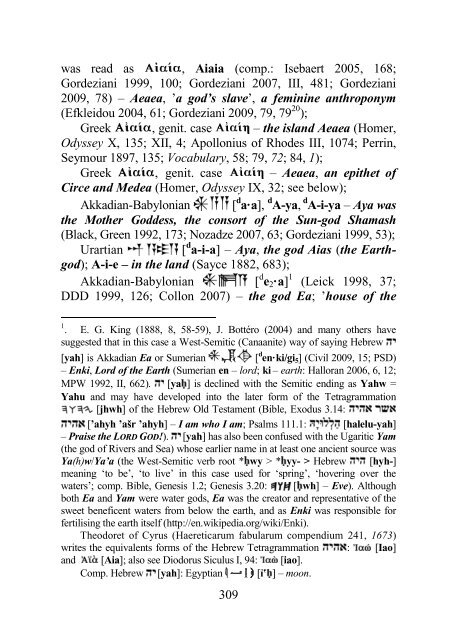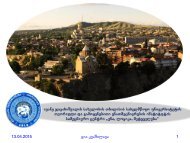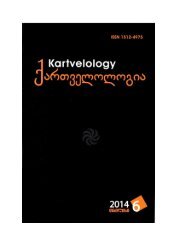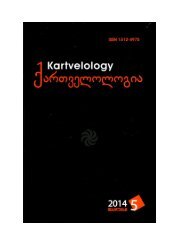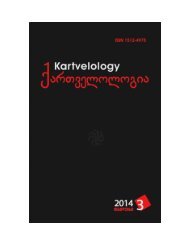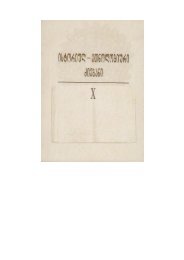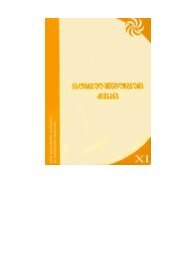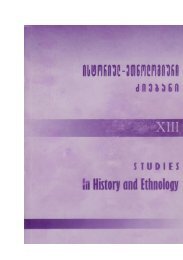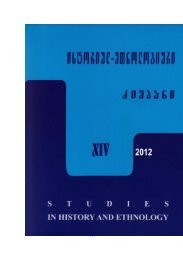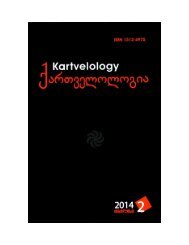Kvashilava, Gia, 2010. On Reading Pictorial Signs of the Phaistos Disk and Related Scripts (2). Rosette (in Georgian and English)
This study concerns the graphic character, symbolic meanings, typological parallels, commentaries and reading of the Phaistos Disk pictorial sign PHD38.
This study concerns the graphic character, symbolic meanings, typological parallels, commentaries and reading of the Phaistos Disk pictorial sign PHD38.
You also want an ePaper? Increase the reach of your titles
YUMPU automatically turns print PDFs into web optimized ePapers that Google loves.
was read as , Aiaia (comp.: Isebaert 2005, 168;<br />
Gordeziani 1999, 100; Gordeziani 2007, III, 481; Gordeziani<br />
2009, 78) – Aeaea, ‟a god’s slave‟, a fem<strong>in</strong><strong>in</strong>e anthroponym<br />
(Efkleidou 2004, 61; Gordeziani 2009, 79, 79 20 );<br />
Greek , genit. case – <strong>the</strong> isl<strong>and</strong> Aeaea (Homer,<br />
Odyssey X, 135; XII, 4; Apollonius <strong>of</strong> Rhodes III, 1074; Perr<strong>in</strong>,<br />
Seymour 1897, 135; Vocabulary, 58; 79, 72; 84, 1);<br />
Greek , genit. case – Aeaea, an epi<strong>the</strong>t <strong>of</strong><br />
Circe <strong>and</strong> Medea (Homer, Odyssey IX, 32; see below);<br />
Akkadian-Babylonian [ d a·a], d A-ya, d A-i-ya – Aya was<br />
<strong>the</strong> Mo<strong>the</strong>r Goddess, <strong>the</strong> consort <strong>of</strong> <strong>the</strong> Sun-god Shamash<br />
(Black, Green 1992, 173; Nozadze 2007, 63; Gordeziani 1999, 53);<br />
Urartian [ d a-i-a] – Aya, <strong>the</strong> god Aias (<strong>the</strong> Earthgod);<br />
A-i-e – <strong>in</strong> <strong>the</strong> l<strong>and</strong> (Sayce 1882, 683);<br />
Akkadian-Babylonian [ d e 2·a] 1 (Leick 1998, 37;<br />
DDD 1999, 126; Collon 2007) – <strong>the</strong> god Ea; ‟house <strong>of</strong> <strong>the</strong><br />
1 . E. G. K<strong>in</strong>g (1888, 8, 58-59), J. Bottéro (2004) <strong>and</strong> many o<strong>the</strong>rs have<br />
suggested that <strong>in</strong> this case a West-Semitic (Canaanite) way <strong>of</strong> say<strong>in</strong>g Hebrew<br />
[yah] is Akkadian Ea or Sumerian [ d en·ki/gi 5 ] (Civil 2009, 15; PSD)<br />
– Enki, Lord <strong>of</strong> <strong>the</strong> Earth (Sumerian en – lord; ki – earth: Halloran 2006, 6, 12;<br />
MPW 1992, II, 662). [ya ] is decl<strong>in</strong>ed with <strong>the</strong> Semitic end<strong>in</strong>g as Yahw =<br />
Yahu <strong>and</strong> may have developed <strong>in</strong>to <strong>the</strong> later form <strong>of</strong> <strong>the</strong> Tetragrammation<br />
[jhwh] <strong>of</strong> <strong>the</strong> Hebrew Old Testament (Bible, Exodus 3.14:<br />
[’ahyh ’ašr ’ahyh] – I am who I am; Psalms 111.1: [halelu-yah]<br />
– Praise <strong>the</strong> LORD GOD!). [yah] has also been confused with <strong>the</strong> Ugaritic Yam<br />
(<strong>the</strong> god <strong>of</strong> Rivers <strong>and</strong> Sea) whose earlier name <strong>in</strong> at least one ancient source was<br />
Ya(h)w/Ya’a (<strong>the</strong> West-Semitic verb root * wy > * yy- > Hebrew [hyh-]<br />
mean<strong>in</strong>g „to be‟, „to live‟ <strong>in</strong> this case used for „spr<strong>in</strong>g‟, „hover<strong>in</strong>g over <strong>the</strong><br />
waters‟; comp. Bible, Genesis 1.2; Genesis 3.20: [ wh] – Eve). Although<br />
both Ea <strong>and</strong> Yam were water gods, Ea was <strong>the</strong> creator <strong>and</strong> representative <strong>of</strong> <strong>the</strong><br />
sweet beneficent waters from below <strong>the</strong> earth, <strong>and</strong> as Enki was responsible for<br />
fertilis<strong>in</strong>g <strong>the</strong> earth itself (http://en.wikipedia.org/wiki/Enki).<br />
Theodoret <strong>of</strong> Cyrus (Haereticarum fabularum compendium 241, 1673)<br />
writes <strong>the</strong> equivalents forms <strong>of</strong> <strong>the</strong> Hebrew Tetragrammation : [Iao]<br />
<strong>and</strong> [Aia]; also see Diodorus Siculus I, 94: [iao].<br />
Comp. Hebrew [yah]: Egyptian [ỉ‛ ] – moon.<br />
309


